Yihan Cang
NC2C: Automated Convexification of Generic Non-Convex Optimization Problems
Jan 08, 2026Abstract:Non-convex optimization problems are pervasive across mathematical programming, engineering design, and scientific computing, often posing intractable challenges for traditional solvers due to their complex objective functions and constrained landscapes. To address the inefficiency of manual convexification and the over-reliance on expert knowledge, we propose NC2C, an LLM-based end-to-end automated framework designed to transform generic non-convex optimization problems into solvable convex forms using large language models. NC2C leverages LLMs' mathematical reasoning capabilities to autonomously detect non-convex components, select optimal convexification strategies, and generate rigorous convex equivalents. The framework integrates symbolic reasoning, adaptive transformation techniques, and iterative validation, equipped with error correction loops and feasibility domain correction mechanisms to ensure the robustness and validity of transformed problems. Experimental results on a diverse dataset of 100 generic non-convex problems demonstrate that NC2C achieves an 89.3\% execution rate and a 76\% success rate in producing feasible, high-quality convex transformations. This outperforms baseline methods by a significant margin, highlighting NC2C's ability to leverage LLMs for automated non-convex to convex transformation, reduce expert dependency, and enable efficient deployment of convex solvers for previously intractable optimization tasks.
LLM-OptiRA: LLM-Driven Optimization of Resource Allocation for Non-Convex Problems in Wireless Communications
May 04, 2025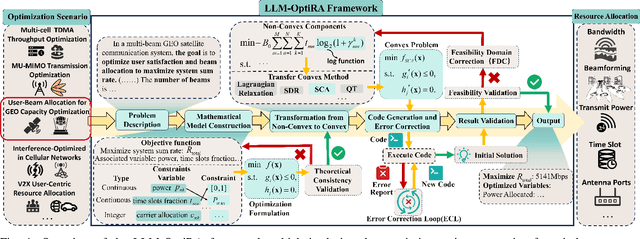

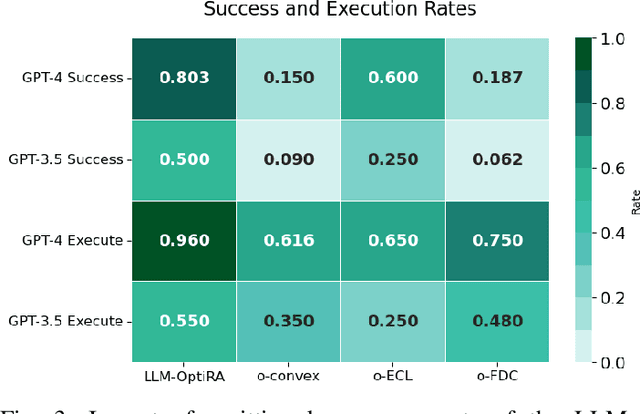
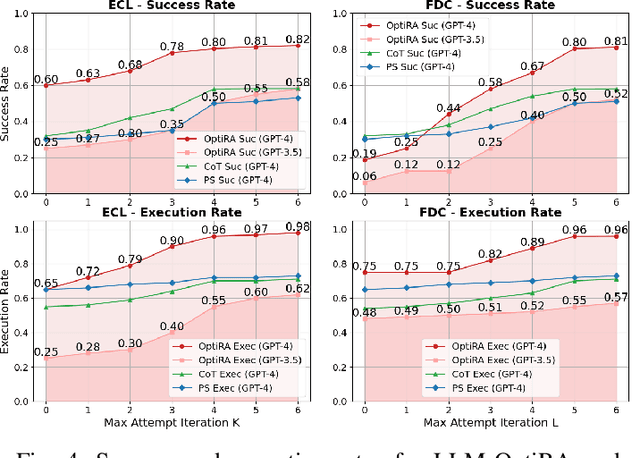
Abstract:Solving non-convex resource allocation problems poses significant challenges in wireless communication systems, often beyond the capability of traditional optimization techniques. To address this issue, we propose LLM-OptiRA, the first framework that leverages large language models (LLMs) to automatically detect and transform non-convex components into solvable forms, enabling fully automated resolution of non-convex resource allocation problems in wireless communication systems. LLM-OptiRA not only simplifies problem-solving by reducing reliance on expert knowledge, but also integrates error correction and feasibility validation mechanisms to ensure robustness. Experimental results show that LLM-OptiRA achieves an execution rate of 96% and a success rate of 80% on GPT-4, significantly outperforming baseline approaches in complex optimization tasks across diverse scenarios.
Joint User Scheduling and Computing Resource Allocation Optimization in Asynchronous Mobile Edge Computing Networks
Jan 21, 2024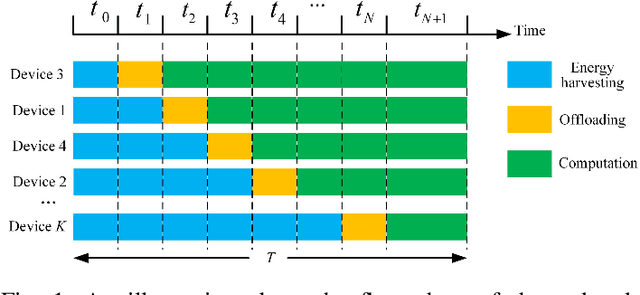
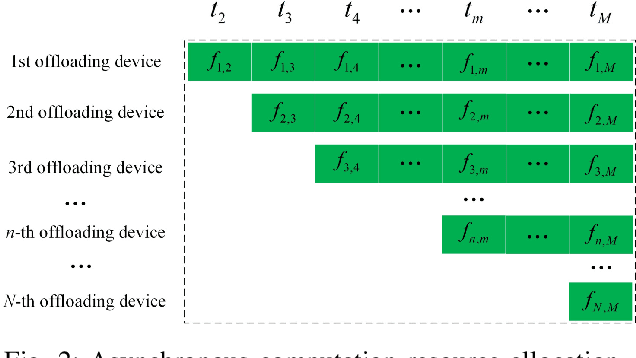
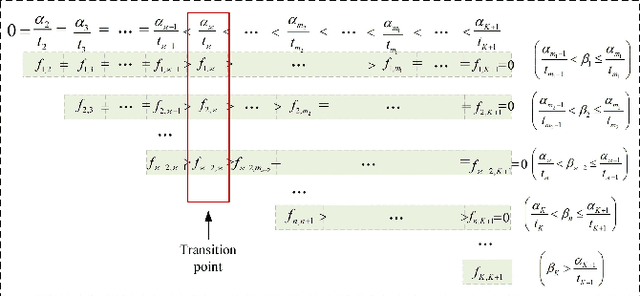
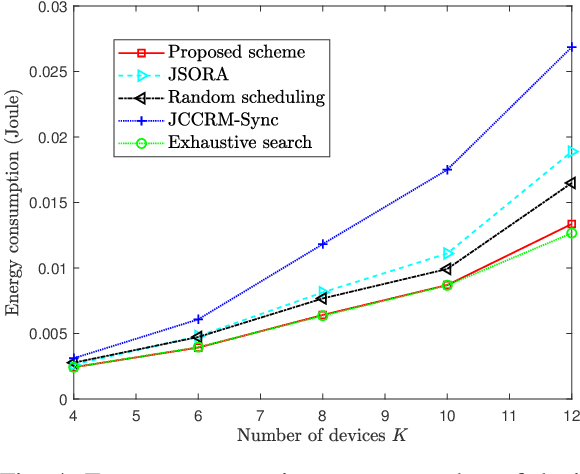
Abstract:In this paper, the problem of joint user scheduling and computing resource allocation in asynchronous mobile edge computing (MEC) networks is studied. In such networks, edge devices will offload their computational tasks to an MEC server, using the energy they harvest from this server. To get their tasks processed on time using the harvested energy, edge devices will strategically schedule their task offloading, and compete for the computational resource at the MEC server. Then, the MEC server will execute these tasks asynchronously based on the arrival of the tasks. This joint user scheduling, time and computation resource allocation problem is posed as an optimization framework whose goal is to find the optimal scheduling and allocation strategy that minimizes the energy consumption of these mobile computing tasks. To solve this mixed-integer non-linear programming problem, the general benders decomposition method is adopted which decomposes the original problem into a primal problem and a master problem. Specifically, the primal problem is related to computation resource and time slot allocation, of which the optimal closed-form solution is obtained. The master problem regarding discrete user scheduling variables is constructed by adding optimality cuts or feasibility cuts according to whether the primal problem is feasible, which is a standard mixed-integer linear programming problem and can be efficiently solved. By iteratively solving the primal problem and master problem, the optimal scheduling and resource allocation scheme is obtained. Simulation results demonstrate that the proposed asynchronous computing framework reduces 87.17% energy consumption compared with conventional synchronous computing counterpart.
Online Resource Allocation for Semantic-Aware Edge Computing Systems
Sep 25, 2023Abstract:In this paper, we propose a semantic-aware joint communication and computation resource allocation framework for MEC systems. In the considered system, random tasks arrive at each terminal device (TD), which needs to be computed locally or offloaded to the MEC server. To further release the transmission burden, each TD sends the small-size extracted semantic information of tasks to the server instead of the original large-size raw data. An optimization problem of joint semanticaware division factor, communication and computation resource management is formulated. The problem aims to minimize the energy consumption of the whole system, while satisfying longterm delay and processing rate constraints. To solve this problem, an online low-complexity algorithm is proposed. In particular, Lyapunov optimization is utilized to decompose the original coupled long-term problem into a series of decoupled deterministic problems without requiring the realizations of future task arrivals and channel gains. Then, the block coordinate descent method and successive convex approximation algorithm are adopted to solve the current time slot deterministic problem by observing the current system states. Moreover, the closed-form optimal solution of each optimization variable is provided. Simulation results show that the proposed algorithm yields up to 41.8% energy reduction compared to its counterpart without semantic-aware allocation.
Resource Allocation for Semantic-Aware Mobile Edge Computing Systems
Sep 21, 2023
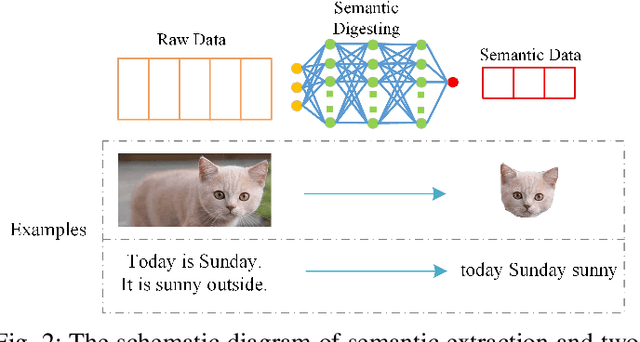
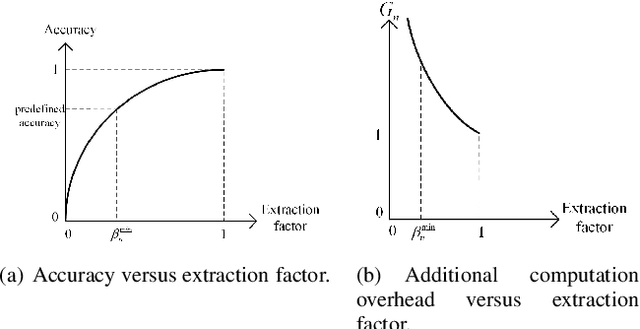
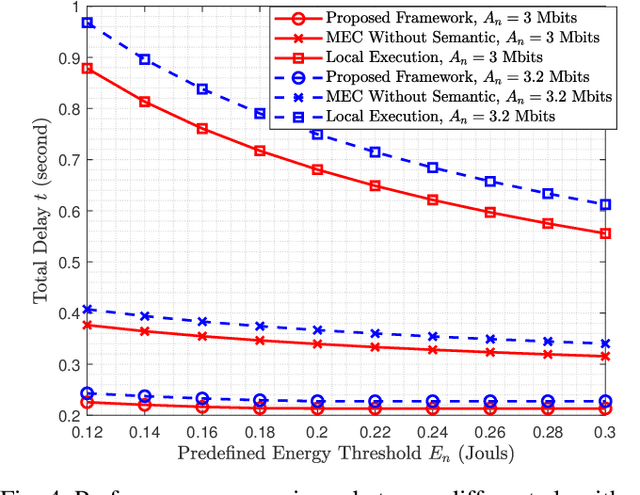
Abstract:In this paper, a semantic-aware joint communication and computation resource allocation framework is proposed for mobile edge computing (MEC) systems. In the considered system, each terminal device (TD) has a computation task, which needs to be executed by offloading to the MEC server. To further decrease the transmission burden, each TD sends the small-size extracted semantic information of tasks to the server instead of the large-size raw data. An optimization problem of joint semantic-aware division factor, communication and computation resource management is formulated. The problem aims to minimize the maximum execution delay of all TDs while satisfying energy consumption constraints. The original non-convex problem is transformed into a convex one based on the geometric programming and the optimal solution is obtained by the alternating optimization algorithm. Moreover, the closed-form optimal solution of the semantic extraction factor is derived. Simulation results show that the proposed algorithm yields up to 37.10% delay reduction compared with the benchmark algorithm without semantic-aware allocation. Furthermore, small semantic extraction factors are preferred in the case of large task sizes and poor channel conditions.
Joint Batching and Scheduling for High-Throughput Multiuser Edge AI with Asynchronous Task Arrivals
Jul 15, 2023



Abstract:In this paper, we study joint batching and (task) scheduling to maximise the throughput (i.e., the number of completed tasks) under the practical assumptions of heterogeneous task arrivals and deadlines. The design aims to optimise the number of batches, their starting time instants, and the task-batch association that determines batch sizes. The joint optimisation problem is complex due to multiple coupled variables as mentioned and numerous constraints including heterogeneous tasks arrivals and deadlines, the causality requirements on multi-task execution, and limited radio resources. Underpinning the problem is a basic tradeoff between the size of batch and waiting time for tasks in the batch to be uploaded and executed. Our approach of solving the formulated mixed-integer problem is to transform it into a convex problem via integer relaxation method and $\ell_0$-norm approximation. This results in an efficient alternating optimization algorithm for finding a close-to-optimal solution. In addition, we also design the optimal algorithm from leveraging spectrum holes, which are caused by fixed bandwidth allocation to devices and their asynchronized multi-batch task execution, to admit unscheduled tasks so as to further enhance throughput. Simulation results demonstrate that the proposed framework of joint batching and resource allocation can substantially enhance the throughput of multiuser edge-AI as opposed to a number of simpler benchmarking schemes, e.g., equal-bandwidth allocation, greedy batching and single-batch execution.
 Add to Chrome
Add to Chrome Add to Firefox
Add to Firefox Add to Edge
Add to Edge